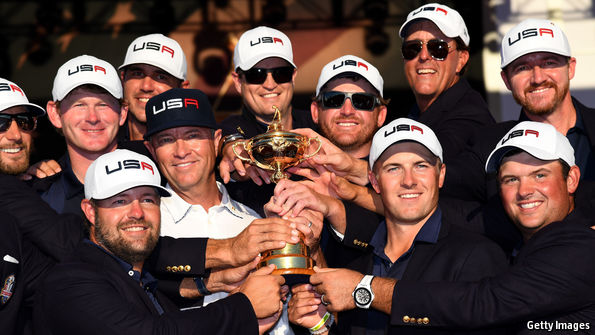
BY THE TIME the last players were finishing their rounds, the winner of the 2016 Ryder Cup was already known. Team USA had not fallen behind their European opponents at any point during the three-day competition at Hazeltine National Golf Club in Minnesota. The tournament is decided using match-play rules, whereby players score points for the number of holes in which they beat their opponents. The Americans established a healthy lead on Friday and Saturday in the foursomes (featuring two opposing pairs, each with a single ball that they take turns to hit) and fourballs (where each player has his own ball). They sealed victory on Sunday with three singles matches remaining.
The final score, with one point awarded for a win and half a point for a draw in each match, was an emphatic 17-11. It was a cathartic success for the Americans. Before last weekend they had triumphed in the prestigious biannual contest just once in the 21st century, and had formed a special “Ryder Cup Task Force” to redress that poor return. European blushes were spared by Martin Kaymer’s late rally which prevented the Americans from collecting an 18th point, something they have not achieved since 1981.
To many spectators—especially the home fans, who roared their side to victory (and irked a few European players in the process)—the margin of the win must have seemed a fair reflection of Team USA’s dominance. The Americans collected all four points on the opening morning, the first time that they had “sweeped” a single session in 35 years. The home side’s confidence was embodied by Patrick Reed, the brawny fist-pumping Texan who beat Rory McIlroy, Europe’s strongest player, in Sunday’s opening game.
But though the score will mean that this year’s edition goes down in the history books as a thrashing, it hides how close the 2016 Ryder Cup was, according to Mark Broadie, a professor of business at Columbia University who invented some of the most used metrics in modern golf analytics (notably “total shots gained”, an average of how much better a player is than the field). Mr Broadie remarked that many of the results at Hazeltine could have gone the other way: 23 of the 28 ties were still undecided as the competitors approached the 16th green, a proportion that has only been exceeded once in the last three decades.
Read Full Article
Leave a comment